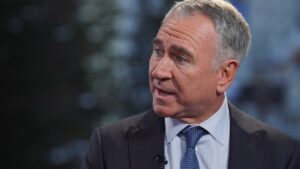Wall Street can wait.
That was the message Monday from the largest part of the roughly $10.6 trillion U.S. corporate bond market, a colossus of Wall Street that idled as investors around the world watched for potential spillover from the debt woes of China’s second-largest property developer.
A handful of U.S. investment-grade companies initially lined up to issue corporate bonds on Monday opted instead to sit out the rocky patch, according to two bond investors and a syndicate banker, as volatility
VIX,
spiked, sending global stocks, crypto assets — including bitcoin
BTCUSD,
— and more tumbling.
Expectations were for $20 billion to $25 billion of issuance this week and there were four to five issuers lined up today, but they stood down due to the market volatility which is being attributed to Evergrande, said Tom Murphy, head of U.S. investment-grade credit at Columbia Threadneedle.
Concerns have ratcheted higher that Chinese property developer Evergrande
3333,
might lose its grip on more than $300 billion of debt, causing ripples throughout the cooling Asian economy and potentially beyond to global financial markets.
Read: Will Evergrande be China’s ‘Lehman moment’? Wall Street says no
The Dow Jones Industrial Average
DJIA,
booked a 1.8% drop Monday, its worst day in nine weeks, but the blue-chip index also finished well above its more-than-900-point plunge at the session’s low. The S&P 500 index
SPX,
fell 1.7% and the Nasdaq Composite Index
COMP,
shed 2.2%.
Among meme stocks, shares of GameStop Corp
GME,
shed 6.2% and those of AMC Entertainment Holdings Inc.
AMC,
fell 8.9%, while Coinbase Global Inc.
COIN,
was 3.5% lower Monday.
Coinbase’s bonds were among the top 10 most actively traded during a down day for the U.S. corporate bond market, with its 3.625% bonds due December 2049 under the most pressure, according to BondCliq.
What happens next?
“Is Evergrande going to restructure? Most likely: Yes,” said John McClain, a Brandywine Global portfolio manager for high yield and corporate credit strategies, in a phone interview.
But McClain also thinks equity markets generally were less “attuned to the underling risks in the China property market” than debt markets have been, given that Evergrande’s U.S.-dollar bonds have been trading in the $20 range for some time.
Since bonds often are issued at par, or a $100 price, that signals debt investors see potential for some of the Chinese lender’s bonds to lose roughly 80% of their value.
That doesn’t necessarily mean the U.S. corporate debt markets have been insulated from any spillover threat, particularly with spreads near record lows. Spreads are the level bond investors are paid above risk-free benchmarks, like Treasurys, to offset default risks.
But the selloff in stocks would likely need to be lasting and sharper before major movements occur in corporate bonds.
“We probably need to see a 15% to 20% drawdown in equity markets before I feel credit markets will see a material backup in spreads,” McClain said.
As of last week, corporate bond issuance this year was nearly $1.16 trillion in the investment-grade sector and a record $355 billion in high-yield, or “junk bonds,” according to BofA Global.
See: Big U.S. companies to kick off post Labor Day borrowing boom
“There are a lot of people owed money by that entity [Evergrande], and it’s far removed from the U.S. investment-grade market. But so was Lehman,” said a syndicate banker who was not authorized to speak publicly about the matter. “But it’s hard not to be sanguine on credit.”
This post was originally published on Market Watch






